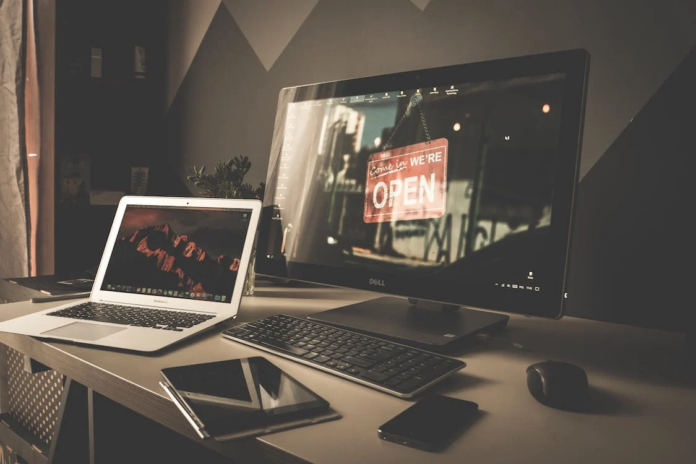Introduction to Laptops vs PCs
Laptops and personal computers (PCs) have become an integral part of our daily lives. They have revolutionized the way we work, communicate, and entertain ourselves. The first personal computer was introduced in 1975 by IBM, and since then, the technology has evolved significantly. Laptops were introduced in the 1980s and have since become increasingly popular due to their portability and convenience. Below we have discussed major differences between laptops vs pcs.

A laptop is a portable computer that is designed to be used on the go. It typically has a built-in screen, keyboard, touchpad or trackball, and battery. A PC, on the other hand, is a desktop computer that is designed to be used at a fixed location. It consists of a tower or case that contains the motherboard, processor, memory, storage devices, and other components. A PC requires an external monitor, keyboard, and mouse to function.
Pros and Cons of Laptops
Laptops have several advantages over PCs. One of the biggest advantages is portability. Laptops are lightweight and compact, making them easy to carry around. They also have a built-in battery that allows you to use them without being plugged into an electrical outlet. Another advantage of laptops is convenience. You can use them anywhere you want – at home, in a coffee shop, or on a plane.
However, laptops also have some disadvantages. One of the biggest disadvantages is limited upgradeability. Most laptops are not designed to be upgraded easily or at all. This means that if you want to upgrade your laptop’s hardware components such as RAM or storage space, you may need to replace the entire device. Another disadvantage of laptops is smaller screen size compared to PCs.
Pros and Cons of PCs
PCs have several advantages over laptops as well. One of the biggest advantages is better performance. PCs are generally more powerful than laptops because they have larger and more powerful components. They also have larger screens, which makes them better for tasks that require a lot of screen real estate. Another advantage of PCs is that they are easier to upgrade. You can easily add or replace components such as RAM, storage space, or graphics cards.
However, PCs also have some disadvantages. One of the biggest disadvantages is that they are less portable than laptops. Personal computer systems are designed to be used at a fixed location and are not easy to move around. They also have shorter battery life compared to laptops.
Price Comparison
When it comes to price, laptops and PCs vary widely in cost. On average, laptops are more expensive than PCs. This is because laptops are designed to be portable and require more specialized components such as batteries and compact designs. PCs, on the other hand, are designed to be used at a fixed location and do not require as many specialized components.
Factors that affect the price of laptops and PCs include the brand, processor type, amount of RAM, storage space, graphics card, and screen size. High-end laptops with powerful processors, large amounts of RAM, and high-end graphics cards can cost several thousand dollars. Similarly, high-end gaming PCs with powerful processors and graphics cards can also cost several thousand dollars.
Performance Comparison
When it comes to performance, both laptops and PCs have their strengths and weaknesses. Laptops are generally slower than PCs because they have smaller components that generate less heat and consume less power. However, some high-end laptops with powerful processors and graphics cards can perform almost as well as desktops.
PCs are generally faster than laptops because they have larger components that generate more heat and consume more power. This allows them to run faster processors and graphics cards without overheating or draining the battery too quickly.
Portability Comparison Between Laptops vs PCs
When it comes to portability, laptops are clearly the winner. Laptops are designed to be lightweight and compact, making them easy to carry around. They also have a built-in battery that allows you to use them without being plugged into an electrical outlet. PCs, on the other hand, are designed to be used at a fixed location and are not easy to move around.
Factors that affect the portability of laptops and PCs include weight, size, and battery life. High-end gaming laptops can weigh as much as 10 pounds, while ultrabooks can weigh as little as 2 pounds. Similarly, high-end gaming PCs can be quite large and heavy, while mini PCs can be quite small and compact.
Conclusion: Which One Reigns Supreme?
In conclusion, both laptops and PCs have their strengths and weaknesses when it comes to comaprison between laptops vs pcs. Laptops are more portable and convenient but have limited upgradeability and smaller screens. PCs are more powerful and easier to upgrade but are less portable and have shorter battery life.
The choice between a laptop and a PC ultimately depends on the user’s needs and preferences. If you need a computer that you can take with you on the go, then a laptop is the way to go. If you need a computer that is more powerful and easier to upgrade, then a PC is the way to go.
Ultimately, both laptops and PCs are essential tools for work, communication, and entertainment in today’s digital age.



